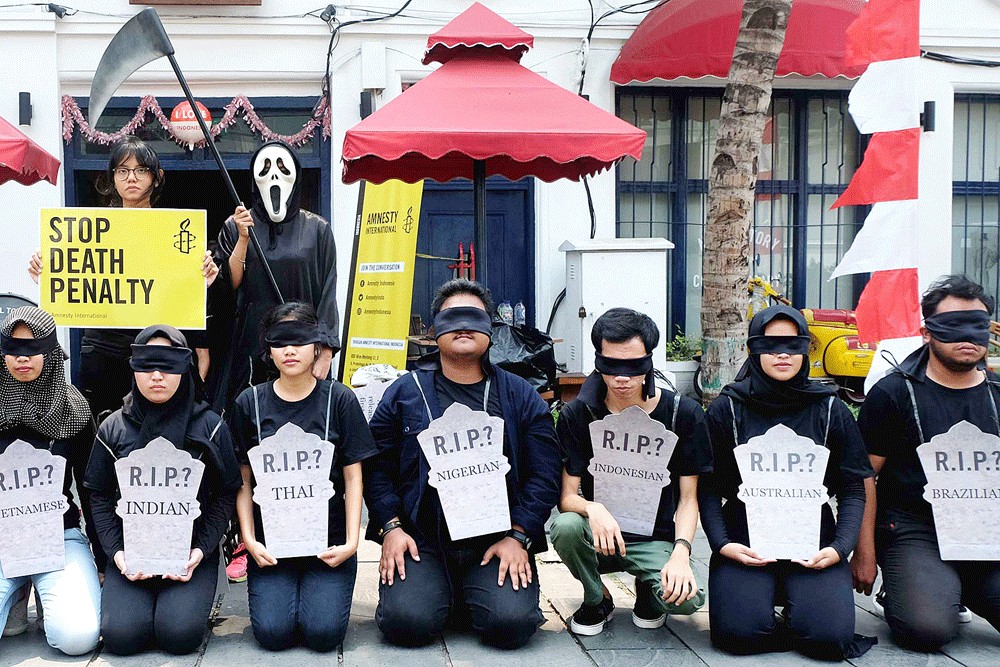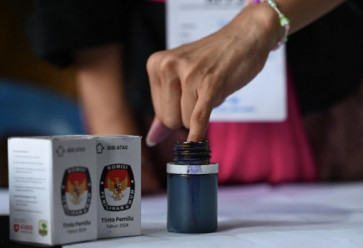Death sentences on rise in RI amid worldwide decline
Indonesia recorded an increase in the number of death sentences last year, mostly for drug offenders.
Change Size

Indonesia recorded an increase in the number of death sentences last year, mostly for drug offenders, and with the COVID-19 pandemic prompting many trials to be held online, due process of law is at risk, according to Amnesty International.
One hundred seventeen new death sentences were meted out by Indonesian judges last year, a 46 percent increase from 80 of such sentences in 2019, an Amnesty International report published on Wednesday said. More than 85 percent of last year’s death sentences were given for drug-related offenses, while the rest were for murder.
The 2020 figure represents the highest number of death sentences in Indonesia since 2016 and stands in contrast to a 36 percent decline in death sentences worldwide last year, the report shows.
Amnesty International Indonesia researcher Ari Pramuditya said the increase in death sentences and the large share of drug crimes could be attributed to the government’s tough stance on drugs. In some cases, he said, judges were citing President Joko “Jokowi” Widodo’s “war on drugs” narrative as considerations in sentencing drug offenders to death.
Jokowi declared a “drug emergency” in 2014, not long after he took office, calling for the death penalty for drug dealers and rejecting clemency pleas for convicted drug traffickers. It had paved the way for the authorities, including those in the justice system, to adopt a more aggressive stance no such crimes.
Indonesia executed 18 death-row drug inmates, including foreigners, between 2015 and 2016, drawing condemnation from the global community. The international reaction has prompted the country to put the execution of death row convicts on hold since 2017.
Read also: Jokowi renews call for tough action on drug abuse, trafficking
The COVID-19 pandemic that hit Indonesia early last year appeared to have little effect on the number of death sentences. Amnesty Indonesia recorded 134 new death sentences between March 2020 and April 2021 -- 94 of which were the result of virtual trials.
“Convicting someone, particularly if [the conviction] relates to his or her life, through a virtual trial [during the pandemic] is very risky -- virtual trials risk denying defendants the right to a just trial,” Ari of Amnesty International Indonesia said.
“Rather than saving lives, the government, in this case, is taking lives.”
Indonesia had at least 482 inmates on death row at the end of last year, including five Malaysians who were convicted for drug trafficking, according to data compiled by Amnesty International.
Leopold Sudaryono, a criminologist from the Australian National University (ANU), said there was a tendency in Indonesia during the Reform Era to expand the death penalty to more crimes. He observed that, since the fall of the New Order government in 1998, there were eight new laws covering 33 types of crimes that allow judges to hand down the capital punishment on convicts.
Leopold called on the government to abolish the death sentence, as it contradicted values enshrined in the state ideology of Pancasila and the Constitution, adding that it was also ineffective in terms of deterring people from committing crimes.
“Studies have shown that there are no deterrent effects [from the death sentence], because crimes punishable with death are often premeditated [crimes], meaning that the offenders have planned for the crimes and are aware of the consequences,” he said.
Anis Hidayah from Migrant Care, an NGO advocating for the rights of Indonesian workers abroad, said that, without abolishing the death penalty at home, the government had no leverage to use in protecting its migrant workers facing capital punishment abroad.
Deputy Law and Human Rights Minister Edward Omar Sharif Hiariej said the government acknowledged that the death sentence was a complex multifaceted issue, with equal arguments having been articulated both in favor of the capital punishment, particularly as a maximum penalty for graft convicts, and against it.
The government, in fact, offered a middle-ground solution in the proposed revision to the Criminal Code, with only special crimes to be punishable by death, Edward said. This would be accompanied with a probationary period, during which the death sentence could be commuted to a life sentence if the convict showed good behavior.
Read also: Jokowi bows to public pressure, calls for delay in passing Criminal Code bill into law
The government, however, delayed the amendment plan in 2019 following widespread protests that rejected the proposed bill that contained controversial articles, such as the potential criminalization of consensual premarital sex, cohabitation and the promotion of contraception.
This year, the bill is not listed as a priority for legislation. But it remains on the list of priority bills for the long-term 2020-2024 National Legislative Program, with the government, along with the House of Representatives as co-sponsor, open to the possibility of deliberating it before 2024.









